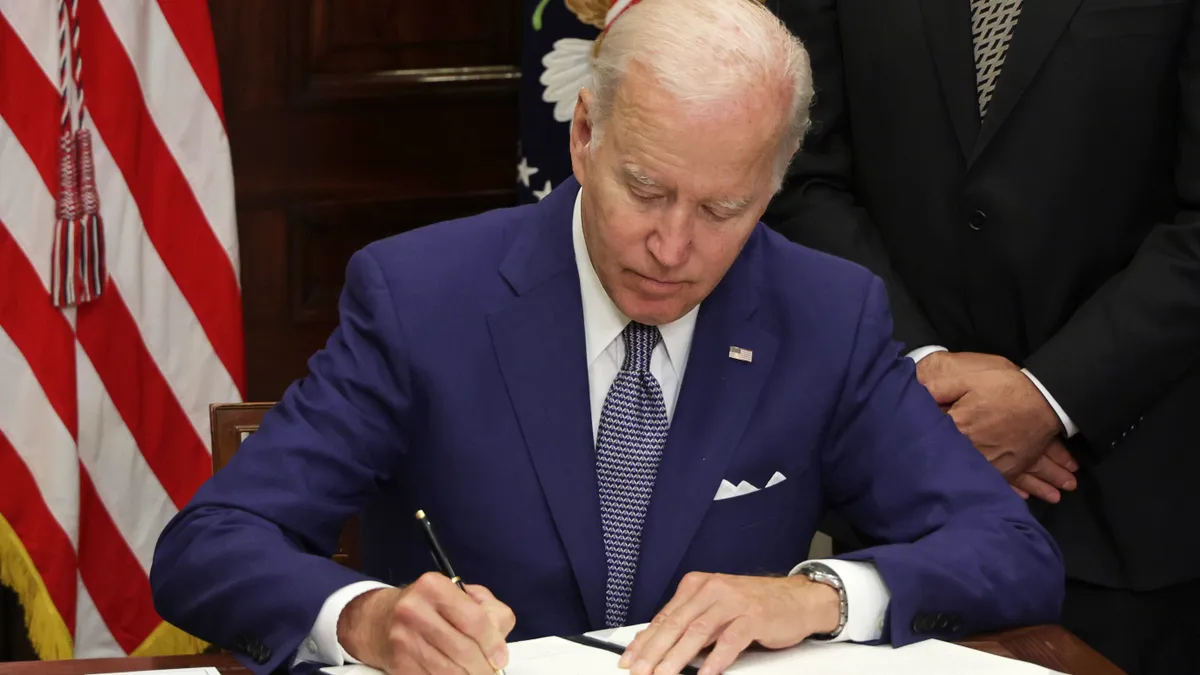Dive Brief:
-
President Joe Biden signed an executive order on Thursday directing federal agencies to create annual, publicly-available Equity Action Plans that evaluate and “address the barriers underserved communities may face in accessing and benefitting from the agency’s policies, programs, and activities,” the White House said in a fact sheet. The White House hopes the effort will help advance racial equity.
-
In addition to asking agencies to create and support in-house equity leadership teams to put Biden’s 2021 executive order on racial equity into practice, the latest directive requires agencies to improve their community outreach and investments in underserved communities.
-
“The reality is that underserved communities—many of whom have endured generations of discrimination and disinvestment—still confront unacceptable barriers to equal opportunity and the American Dream,” the fact sheet said. “As the President has said: ‘Advancing equity is not a one-year project. It’s a generational commitment.’”
Dive Insight:
Under Wednesday’s executive order, federal agencies will be required to reach out to underserved communities by, for example, carrying out listening sessions, outreach events or requests for information that are “culturally and linguistically appropriate,” the executive order said. They must also collaborate with the Office of Management and Budget to improve community engagement concerning agency budgets and rulemaking. In addition, agencies will be required to create more flexibility, incentives and guidelines for funding and permit recipients.
The White House also hopes to address widespread concerns about economic and social inequality in U.S. cities by “advancing community wealth building projects; preventing physical and economic displacement as the result of Federal investments; facilitating equitable flows of private capital, including to underserved communities; and incorporating outcome-based metrics focused on urban equitable development in the design and deployment of Federal programs and policies.”
Federal agencies will also have to consider whether new federal facilities are near existing employment centers and accessible by public transportation and evaluate their role in displacing residents.
“Agencies shall identify displacement risks associated with Federal facility siting and development and shall engage with any community that may be affected, along with appropriate regional and local officials, to mitigate those displacement risks,” the executive order said.
Advocates for racial equality heralded the measure as a step in the right direction.
Derrick Johnson, president and CEO of the National Association for the Advancement of Colored People tweeted, “President Biden today is taking yet another step to advance racial equity, by signing a new executive order which will invest in underserved communities, address emerging civil rights risks, and improve economic opportunities in rural and urban communities. This is a big deal.”
As part of the federal initiative, the Department of Housing and Urban Development opened a portal allowing local governments to request technical assistance for its Thriving Communities program to help align their housing needs with their infrastructure investments under 2021’s bipartisan infrastructure law.
“A thriving community is intentional about building and preserving affordable housing near public transportation and leveraging infrastructure investments to support its housing goals. Cities can now apply for technical assistance to help preserve affordable housing, identify opportunities for location-efficient housing, and reduce barriers to housing production,” HUD Secretary Marcia Fudge said in a statement. “HUD is encouraging a holistic approach to bringing housing and transportation together with the help of local governments, transit authorities, metropolitan planning organizations, the private sector, and community-based organizations.”
Other initiatives include advancing equitable procurement, improving data equity and transparency, boosting economic development in rural communities and addressing emerging civil rights concerns such as biased algorithms in AI.
Wednesday’s executive order builds on Executive Order 13985, which mandated that all federal agencies revise their policies to address racial inequalities during implementation.












